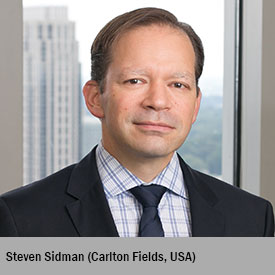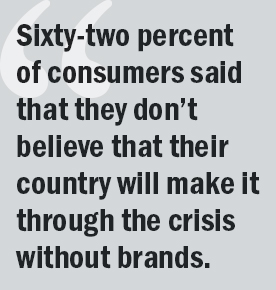INTA News
Branding Strategies for the Tastiest Trademarks
Published: November 1, 2018
 With just a few days to go before INTA’s 2018 Leadership Meeting in New Orleans, Louisiana, speakers like Steven Sidman (Carlton Fields, USA) are gearing up to address some of the most exciting topics in trademarks and branding today. Mr. Sidman, an entertainment transactional attorney by trade, and a long-time representative of budding and iconic restaurateurs alike, has assembled a star-studded panel to examine “Branding for Restaurants: Strategizing the Branding of New Restaurants, the Branding of Restaurant Groups, and the Rebranding of Old Restaurants,” which will take place on November 7 from 10:30 am to 11:30 am.
With just a few days to go before INTA’s 2018 Leadership Meeting in New Orleans, Louisiana, speakers like Steven Sidman (Carlton Fields, USA) are gearing up to address some of the most exciting topics in trademarks and branding today. Mr. Sidman, an entertainment transactional attorney by trade, and a long-time representative of budding and iconic restaurateurs alike, has assembled a star-studded panel to examine “Branding for Restaurants: Strategizing the Branding of New Restaurants, the Branding of Restaurant Groups, and the Rebranding of Old Restaurants,” which will take place on November 7 from 10:30 am to 11:30 am.
With the increased exposure chefs and restaurants have today, thanks to changing technology and an explosion in television and other media geared to cooking and celebrity chefs, the prospect of branding in the food service and hospitality industry has undergone a sea change in the last 10 to 20 years. The result is that even the smallest independent restaurateur or chef must consider trademark and branding issues as a core part of the business. Mr. Sidman spoke with the INTA Bulletin about some of the unique issues his panel will address.
Who are your panelists and what perspectives will they bring to the topic?
I’m really proud of the panel that we’ve assembled and very fortunate that I was able to lean heavily on some cherished friends and long-time colleagues of mine. I’m humbled by their willingness to participate. They come from wildly varied backgrounds, so will bring real depth and breadth to the panel:
- Kristen Fancher (Margaritaville Enterprises, LLC, USA) has worked on matters for Jimmy Buffett for many years and is now Chief Legal Officer and General Counsel at Margaritaville Enterprises, LLC, where she handles all of the various lifestyle branding ventures Jimmy Buffett is involved with. The company’s holdings are incredibly diverse, including restaurants, retail shops, prepared foods and beverages, non-food & beverage consumer goods, casinos, resorts, vacation ownership, retirement communities, and a national radio station on SiriusXM. Kristen’s perspective is going to be very insightful.
- Joseph V. Tripodi (The Subway Corporation, USA) is Chief Marketing Officer (CMO) for The Subway Corporation and was previously Global CMO of The Coca-Cola Company. Given that Subway is the largest single-brand restaurant chain in the world, and that Joe also led the marketing efforts of the most recognizable beverage brand in the world, I thought he’d bring an interesting (and non-lawyerly) perspective.
- Joshua Siegel (Momofuku Group, USA) is Vice President of Development and General Counsel at Momofuku Group, the holding company for the interests of the world-renowned chef and restaurateur, Chef David Chang. Josh previously practiced law at Stroock & Stroock & Lavan and has helped oversee the explosive expansion of Chef Chang’s international culinary brands. He has a deep background in representing highly successful, globally recognized, high-end dining groups.
- And then we have Chef Alon Shaya (Pomegranate Hospitality, USA), a James Beard Foundation Award – winning chef based in New Orleans with his award-winning flagship, Saba, and whose new venture, Pomegranate Hospitality, just expanded into Denver, Colorado, with the opening of Safta. Chef Shaya was involved in a high-profile trademark dispute, in which my law firm represented him, with another New Orleans chef. He comes from an individual restaurateur background-he started with nothing and rose to the highest levels of the American culinary scene, but then had to rebuild his brand due to trademark-related matters.
Why is this a timely topic?
It’s timely for a number of reasons. Perhaps most obviously because there is growing interest in the food and hospitality world due to increased exposure on various visual media, such as television and the Internet-and not only from a purely marketing and publicity perspective. So much about the way brands generally, including food service,  hospitality, and so-called lifestyle brands, interact now is tech-driven. Even if we were to focus solely on the technological aspect, we’d be able to fill the hour without fear of contradiction among these panelists, because each of their brands has such a different relationship with its customer base. There is this white-hot spotlight being shone on the industry right now and a cult of celebrity surrounding high-profile chefs.
hospitality, and so-called lifestyle brands, interact now is tech-driven. Even if we were to focus solely on the technological aspect, we’d be able to fill the hour without fear of contradiction among these panelists, because each of their brands has such a different relationship with its customer base. There is this white-hot spotlight being shone on the industry right now and a cult of celebrity surrounding high-profile chefs.
How is that a change from a decade or so ago?
Certainly as it relates to the more sophisticated chefs and restaurateurs, the fact that they’re focusing at all on branding is a sea change. In large measure, until you had this explosion of media interest in the last 20 years, chefs as brands unto themselves didn’t exist in the manner we recognize today, with a few notable exceptions, such as Julia Child and Jacques Pepin. Restaurants as brands were pretty much limited to fast food franchises or what are now known as “fast-casual” concepts. Now, individual chefs and restaurateurs are starting to see themselves as brands in their own right. They’re beginning to see that, beyond their recipes, there is a limitless array of opportunities that might only be indirectly related to their food product or hospitality services, including the commercial exploitation of their own names and likenesses.
What are some examples of the unique challenges faced by brands in the food service and hospitality industry that will be addressed?
I wanted to structure the panel the way I did because the panelists can all address different types of challenges. Chef Shaya can describe in tear-jerking detail about all of the mistakes young restaurateurs make, which includes not focusing at all on the implications of trademark ownership and control and all of the pitfalls that go along with that. Then you have Kristen’s perspective, where she is dealing with a very diversified conglomerate, but that still at the end of the day is not Coca-Cola or McDonald’s. She’s advising Jimmy Buffett and his team about how to grow and monetize the brands and marks in a space where the source of the brand’s fame is only partially related to the actual goods and services they’re providing. Joe will weigh in from on high to talk about what it means to conceive of branding strategies for an absolutely iconic brand like Coca-Cola and also what it’s like to guide a different monolithic brand out of a tarnishing event. And Josh, alongside whom I just completed a rather high-profile New York restaurant deal-our clients are co-venturers in a high-end dining concept-will be able to give some fascinating insight on the highly developed, high-concept end of the culinary spectrum based on his work with Chef Chang, one of the most influential and revered culinarians of his generation.
What practical takeaways do you hope to provide those who attend the session?
I hope to show them that those of us in this discipline cast a very wide net in trying to identify opportunities and potential issues that might arise out of those-both legal and commercial. When you’re representing a brand, these are all things that should be taken into consideration in terms of rights you might be giving up or want to acquire. The parent company for Subway, for instance, is Doctor’s Associates, Inc., which started in Bridgeport, Connecticut (USA), back in the mid-1960s. You never know when one little sub joint in Connecticut is going to become the world’s largest franchisor, so “an ounce of prevention is worth a pound of cure,” as the Benjamin Franklin quote goes. If you think about these things as the brand is developing, it can help you to navigate the waters more effectively.
What else are you looking forward to at the Leadership Meeting?
First of all, I’m extraordinarily appreciative of the opportunity to talk about an issue that has occupied a large part of my practice for the last decade or so. But more importantly, I don’t hold myself out as a trademark or licensing attorney per se, so I’m excited about the prospect of learning from the professionals who deal at the cutting-edge of these issues all day, every day. I consider these issues on an almost daily basis because of this niche I have crafted for myself as part of a broader transactional practice in the entertainment space, but I welcome the broad perspective and deep insight of those in the trenches dealing with them at a very high level.
NEW: INTA Influencers
On November 7, from 9:00 am to 10:00 am, just before Mr. Sidman’s panel, hear from some of INTA’s experienced leaders as they share personal stories about their careers, experiences, and interests beyond trademarks. These concise and compelling talks on topics that are meaningful to them will motivate and inspire your own personal and professional growth.
 Emotional Quotient (EQ) and Emotional Intelligence (EI): The IQ of the Future
Emotional Quotient (EQ) and Emotional Intelligence (EI): The IQ of the Future
Rudy Gaines, Womble Bond Dickinson (US) LLP (United States). Rudy is a long-time INTA member and volunteer who currently serves on the Unreal Campaign Committee. Rudy will share his insight on boosting your emotional quotient (EQ) and emotional intelligence (EI), essential self-knowledge needed for a successful career, allowing you to build strong client relationships, manage occupational stress, and minimize professional liability risks.
 INTA Core Values: Taking Your Career to the Next Level
INTA Core Values: Taking Your Career to the Next Level
Gustavo Giay, Marval, O’Farrell & Mairal (Argentina). Gustavo is a former INTA Board member who currently serves on the Data Protection Committee. Gustavo will share his personal experience with INTA core values and how he has used INTA’s member benefits to take his career to the next level.
 More Than Footprints: Utilizing the Power of INTA to Effect Positive Change
More Than Footprints: Utilizing the Power of INTA to Effect Positive Change
Marion Heathcote, Davies Collison Cave (Australia). Marion has been a member of INTA since 1994 and is also a former INTA Board member. She currently serves on the Pro Bono Committee and the Global Advisory Council-Asia-Pacific. Marion will share how her passions, her professional career, and her years with INTA have intersected to create positive change.
To register for the Leadership Meeting or to learn more, visit the meeting homepage. Please note registration is exclusive to current and incoming Board of Directors and Counsel, Past Presidents, and Past Counsel, as well as current (2018-2019 term) Committee Chairs and Vice Chairs, Subcommittee Chairs, Committee Members, Project Team Members, Program Speakers, and IP Office Representatives.
Although every effort has been made to verify the accuracy of items in the INTA Bulletin, readers are urged to check independently on matters of specific concern or interest. Law & Practice updates are published without comment from INTA except where it has taken an official position.
© 2018 International Trademark Association